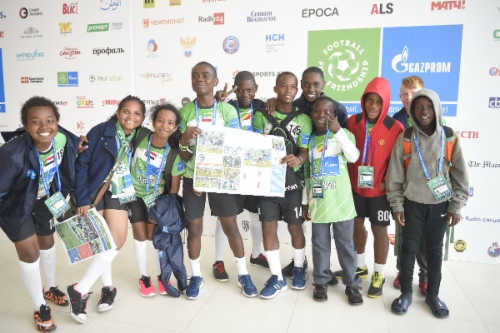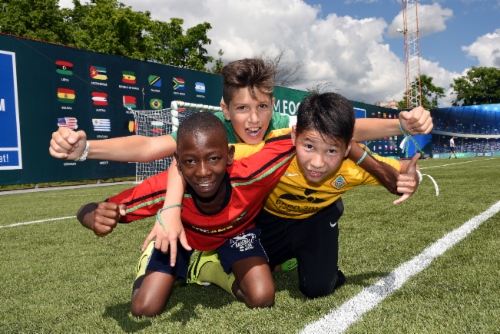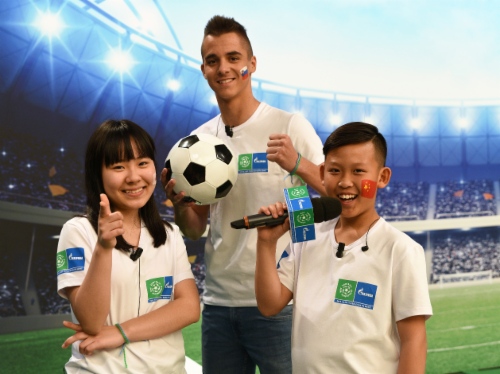Football for Friendship
Football for Friendship (F4F) is an annual international children's social program implemented by Gazprom since 2013. The program includes a number of sports and educational events held in different countries around the globe with the aim of promoting a healthy and active lifestyle, as well as fostering an attitude of respect toward other cultures among its Young Participants.

Participants of Second Football for Friendship International Children’s Forum. Lisbon, 2014

Every year, thousands of people across the world take part in F4F. In the course of the past 9 seasons, it has brought together more than 16,000 participants, gaining over 6 million supporters. Since its launch, the project has expanded its geography to 211 countries and regions. By 2021, the project has set three GUINNESS WORLD RECORDS™ titles: for the most multinational football training session in history, for the most users in a football video hangout, and for the most visitors at a virtual stadium.

Gazprom’s Football for Friendship international children’s social programme wins GUINNESS WORLD RECORDS® title for Most Nationalities in Football Training Session
The F4F program's key objectives include:
- developing children's football around the world;
- promoting an active and healthy lifestyle;
- encouraging the social involvement of youth in sports and culture;
- fostering a multicultural worldview;
- promoting essential shared human values on a global scale.
In order to achieve these objectives, a number of sports and educational events are being implemented within the program:
- International Day of Football and Friendship;
- Football for Friendship Open Draw;
- International Football for Friendship Coaches Academy;
- Football for Friendship International Children's Press Center;
- International Friendship Camp;
- Football for Friendship International Forum;
- Football for Friendship World Championship.
2020 marked a special beginning for the Football for Friendship programme with the new online events format introduced, which included together with the classic activities that transformed into online several new elements:
- Multiuser football simulator Football for Friendship World;
- Football for Friendship eWorld Championship (eF4F);
- International Football for Friendship Award.

Children participating in the final F4F events not only meet and communicate with their peers from other countries, as well as with famous football players and public figures, but also become Young Ambassadors to further promote universal values by themselves among their age-mates. The events of the program are covered by the world's leading media and by Young Reporters, for whom the International Children's Press Center is set up every year.

Young journalist reporting on F4F events in Berlin, June 5–7, 2015
At the end of the final events, Gazprom supplies all project participants with tickets to the UEFA Champions League Final. For the entire duration of the programme, children are provided with accommodation, meals, transportation services, attending personnel (including security officers), and round-the-clock medical care.
The F4F program is supported by FIFA and UEFA, the Olympic and Paralympic Committees, and such renowned footballers as Andrey Arshavin, Vitor Baia, Didier Drogba, Roberto Carlos, Marco Materazzi, Luis Neto, Alexey Smertin, Dmitry Sychev, Anatoly Timoshchuk, Alexander Kerzhakov, Igor Akinfeev, Julio Baptista, Iker Casillas, Michel Salgado, Julian Draxler, Franz Beckenbauer, Nikita Simonyan, Ralf Faehrmann, Celia Sasic, Ricardo Carvalho, Luis Garcia, Robert Pires, Kelly Smith, Eric Abidal, as well as many football associations and federations worldwide. F4F has received awards at both international and national levels for its contributions to promoting sports, social responsibility, and communications.

Ramon Pont, Vice President of FC Barcelona Foundation, receiving Nine Values Cup during International F4F Forum in Berlin, June 6, 2015
The International Day of Football and Friendship, the official holiday of the program, is celebrated internationally on April 25 with friendly matches, flash mobs, radio marathons, master classes, TV shows, open training sessions, and many other events, which are attended by renowned footballers and representatives of sports and public organizations. About 100,000 people participate in the celebrations annually.
The Football for Friendship Open Draw is an essential F4F mechanism for the formation of International Friendship Teams. The Open Draw process is based on the F4F principle that implies unity regardless of gender, ethnicity, background, social status, and physical capacities. The Open Draw is also attended by the Young Participants of the preceding seasons and by famous athletes.

Final game of F4F International Street Football Tournament near Brandenburg Gate in Berlin, June 6, 2015
The International Football for Friendship Coaches Academy is a free-of-charge online learning platform offering a number of practical video lessons aimed at improving the skills of coaches teaching youth teams, sports groups and P.E. classes. The training course was developed by the authors of F4F sports and humanitarian educational programs, namely by teaching managers and coaches from the academies of FC Barcelona and experts of UEFA's humanitarian programs. Any coach who is training a children's team or teaching P.E. classes is welcome to become a student of the Academy. Applications are accepted at academy.footballforfriendship.com.
The Football for Friendship International Children's Press Center is a platform for mastering and improving journalism skills, with Young Journalists as its key figures. The Press Center begins its work one month prior to the annual Football for Friendship International Forum, in order for Young Journalists to collect information about the program, prepare the materials on the initiatives implemented in their countries within the new F4F season, and acquire basic journalism skills to cover F4F events.
The Football for Friendship International Camp is a three-day event organized in anticipation of the Football for Friendship World Championship and the Football for Friendship International Forum. The camp offers master classes held by famous footballers, as well as training sessions, exercises and other activities. Young Participants train under the guidance of Young Coaches and study the key values of F4F at the Nine Values School.

International Street Football Tournament. Lisbon, 2014
The International Football for Friendship Forum is a unique platform where the program participants jointly discuss the issues of promoting children's football around the world and the ways to resolve them. During the Forum, members of international delegations meet with acclaimed athletes, representatives of sports organizations and federations, ambassadors and other public figures, with whom they speak about the most efficient ways of promoting the key values of F4F worldwide.
The Football for Friendship World Championship is a full-scale tournament with the standings compiled. Following an official opening ceremony, teams play qualifying games to determine the participants of the quarter-final, semi-final, and the final. Traditionally, the winning team is rewarded with medals.
All of the key events have their messages reflected in the trophies and symbols of the F4F program:
The Nine Values Cup is a unique trophy of the F4F program. It has been awarded annually since 2015 to a professional football club both for sporting achievements and for the implementation of social initiatives. The Nine Values Cup is presented to football clubs showing the strongest commitment to the F4F program's values, such as friendship, equality, fairness, health, peace, devotion, victory, traditions, and honor. The unique feature of the Nine Values Cup is that its winners are chosen by the children participating in the F4F program.

Nine Values Cup
The Cup was first produced in 2015 by the well-known German sculptor Achim Ripperger especially for the F4F program. As of today, the Nine Values Cup has been awarded to such football clubs as Barcelona (Spain, 2015), Bayern (Germany, 2016), Al-Wahda (Syria, 2016), Real Madrid (Spain, 2017), the Brazilian national football team (Brazil, 2018), Liverpool (England, 2019), Barcelona (Spain, 2020 and 2021).

Winners of Football for Friendship World Championship with trophy cup
The Friendship Bracelet is an official F4F symbol established in 2014. The bracelet is made of two simple strings, one blue and one green. Blue signifies a clear, cloudless sky, and green is a symbol of the football field – a field that always remains the same and is available to everyone in every place of the world, regardless of age, gender, and social status.

Friendship Bracelet
By wearing the Bracelet, people demonstrate their readiness to share the key values of F4F: friendship, equality, fairness, health, peace, devotion, victory, traditions, and honor. The Friendship Bracelet's wearers include not only Young Ambassadors of F4F all across the world, but also such footballers as Anatoly Timoshchuk, Didier Drogba, Franz Beckenbauer and Alexander Kerzhakov, as well as Fatma Samoura, Secretary General of FIFA, Viktor Zubkov, Chairman of the Gazprom Board of Directors, and many others.

Andreas Kuen exchanging Friendship Bracelets with children from FC RAPID, participants of F4F 2015 from Austria
Football for Friendship World
Football for Friendship World (F4F World) allows to organise international teams games in real time. Behind each of the football players are users from different countries. Each team has a goalkeeper, a defender, two forwards, two halfbacks, a coach, and substitute players. In the F4F World, users can join teams or create their own; invite random players or their friends. Players can enjoy a classic game of football and also matches with the rules based on the Nine Values of the programme: friendship, equality, fairness, health, peace, devotion, victory, traditions, and honour.

F4F World Game
Football for Friendship World features:
- original hand-drawn design and unique character customization;
- multi-level modes: football player, club coach, football fan;
- opportunity to participate in matches according to the rules of Football for Friendship and their modifications using power-ups;
- ability to create clubs and invite random players or friends from different countries to join;
- club career management with the ability to play in multiple divisions and international leagues.
On December 10, 2020, the multiuser football simulator F4F World was released to the public allowing everyone from across the globe to play in mixed teams according to the F4F principle from the safety of their homes.
Football for Friendship eWorld Championship (eF4F)
The competition was organized on the platform of the new specially designed multiplayer football simulator Football for Friendship World (F4F World). The Granular Salamander team that untied young players from Bosnia and Herzegovina, Kazakhstan, Latvia, the United Arab Emirates, Russia and Turkey became the winners of the first-ever eChampionship.
In 2021, Team Argali represented by players from Aruba, Belize, Guatemala, Costa Rica, and Mexico became the winners of the final game of the championship. Yazn Taha, a 14-year-old commentator from Syria, commented on the game.
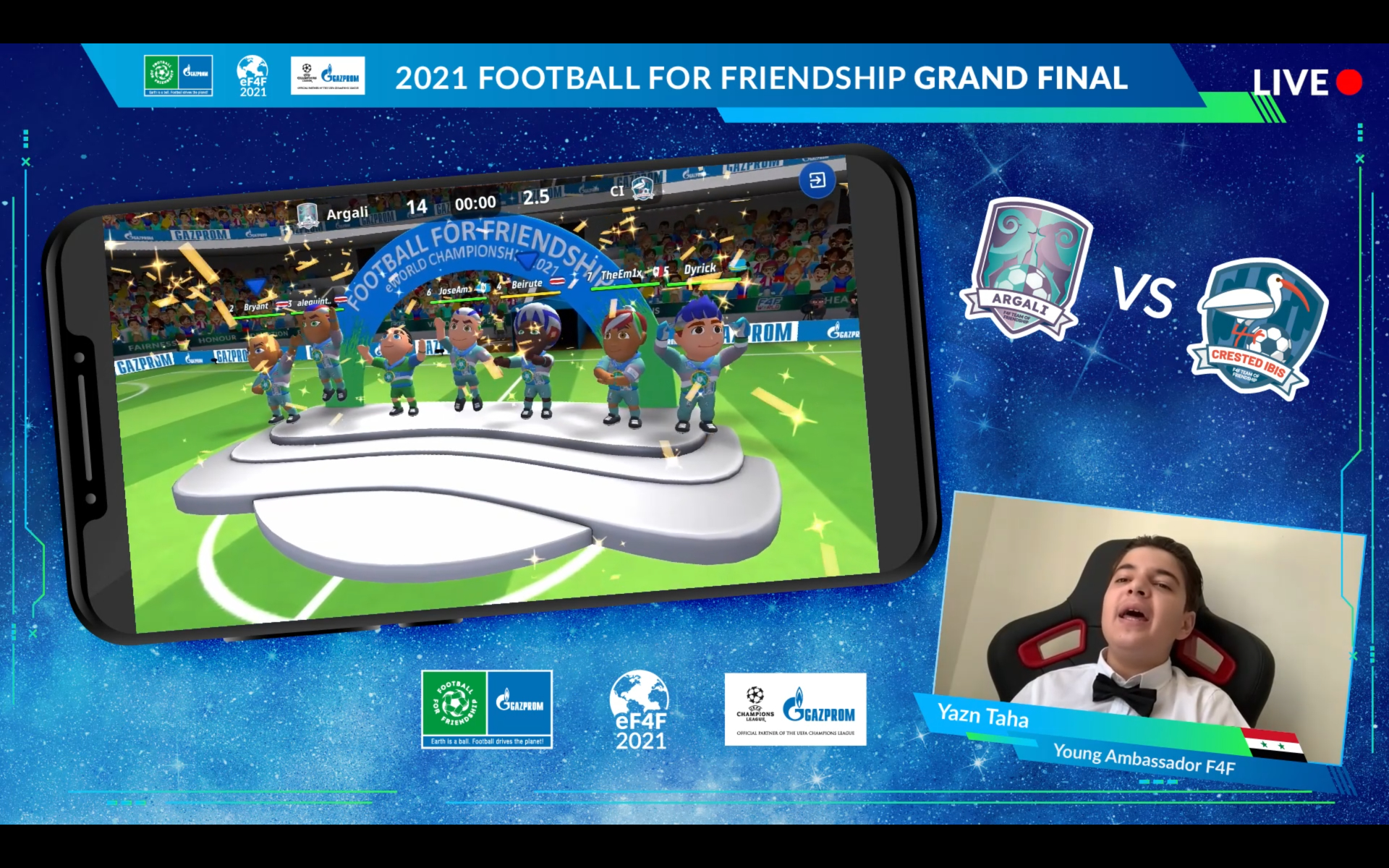
2021 Football for Friendship eWorld Championship Final
International Football for Friendship Award
In 2020, a unique award was created as part of the International F4F Forum – the International Football for Friendship Award – with the goal of helping organizations involved in the development of youth football to identify and promote all possible digital ideas in the field of sports training.

International Football for Friendship Award
The SLSFA Sri Lanka Schools Football Association and the Sri Lanka Ministry of Education presented an online concept of competitions and contests for children of all age groups. The Brazilian Football Confederation launched several social projects, including those aimed at training goalkeepers, providing social services, and supporting a highly active lifestyle during the pandemic-related period of self-isolation. In total, over 100 football academies and federations submitted applications to participate in the Football for Friendship Forum. Projects were presented in the following nominations:
- Changing the World: Educational Activities;
- Stadium Is Where I Am: Improving Football Skills;
- Earth is a Ball: Providing Football to Everyone;
- Driving the Planet: Building Football Community.
All the projects were evaluated by the International Expert Council, which included world experts in the field of football education: Frank Ludolph, Germany, UEFA Head of Football Education Services, Head of the Expert Council of the 2020 International Football for Friendship Award; Pablo Cesar Torres, Uruguay, President of Youth Football and Scouting at Club Atlético Peñarol, Mike Puig, Spain, CEO of the Soccer Barcelona Youth Academy; and three Football for Friendship Young Ambassadors: Ananya Kamboj, India, Mohammad Yusuf Moazzam, Pakistan, and Sheqayli Ascencion, Aruba.
Football for Friendship: Euro 2020 International Children’s News Bureau
Within the framework of the UEFA Euro 2020, the Football for Friendship programme launched an initiative of the International Children's News Bureau with the participation of Football for Friendship Young Journalists from 11 countries of the Championship.
Young Journalists visited all the championship matches in their countries and covered them for millions of their peers in the world. They became Young Ambassadors of the Football for Friendship programme, covering the events of the Championship through the prism of the Nine Values shared by millions of program participants: friendship, equality, justice, health, peace, loyalty, victory, traditions, and honour.
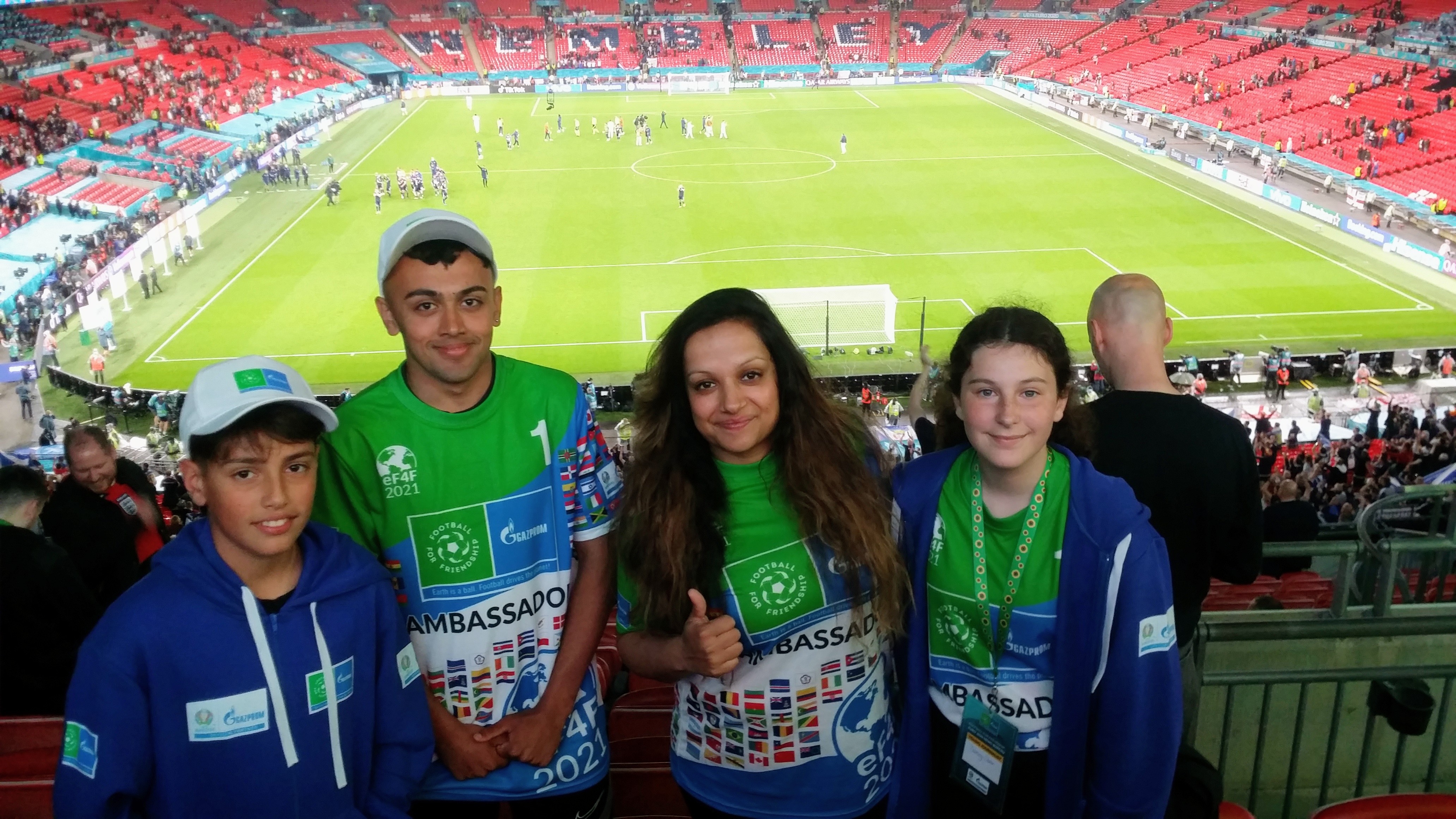
Young Journalists at the Euro 2020 game
To successfully carry out with their mission, Young Journalists trained at the Nine Values School of Football for Friendship. In addition to the values, the classes focused on current trends in sports journalism and mobile journalism skills.
The first-ever football NFT trophy for the UEFA Euro 2020 Goal of the Tournament
In May 2021, UEFA announced that Gazprom would be a sponsor at the 2020 and 2024 editions of the UEFA EURO. The terms of cooperation included the presentation of the award for the Goal of the tournament UEFA EURO 2020, which was designed as an NFT trophy – a digital non-renewable version of a work of art.
The physical prototype of the prize was created by the Russian caligraffiti artist Pokras Lampas at the Gazprom booth in the fan zone at Konyushennaya Square, St. Petersburg, as an installation artwork featuring 432 footballs ornamented with calligraphic patterns.

Pokras Lampas creating the physical prototype of the trophy
The digital trophy encodes the names of the UEFA EURO 2020, Gazprom, the Football for Friendship international children's social programme and the Nine Values it promotes: friendship, equality, justice, health, peace, loyalty, victory, tradition and honour.
On 27 June, the installation ceased to exist as a physical object and was reborn as a digital artwork in the NFT format, as was the artist's plan. All the footballs were distributed across 11 cities that hosted the UEFA EURO 2020.
On 15 October, during the awarding ceremony, the digital trophy was presented to Patrick Schick, the player who scored the best goal in the 2020 UEFA European Football Championship, and a hologram of the award was put on display at UEFA headquarters.
Project geography
2021
12-14-year old girls and boys from over 200 countries have joined the season of the programme.
2020
This season, the first-ever Football for Friendship eWorld Championship united young athletes from 104 countries.
2019
More than 800 children and adults from Europe, Asia, Africa, and the Americas, more than 160 journalists from the leading national and international media companies.
2018
211 countries and regions representing Asia, Africa, Australia and Oceania, Europe, and the Americas.
2017
64 countries: Algeria, Argentina, Armenia, Austria, Azerbaijan, Bangladesh, Belarus, Belgium, Bolivia, Brazil, Bulgaria, China, Croatia, the Czech Republic, Denmark, Egypt, Estonia, Finland, France, Germany, Ghana, Greece, Hungary, Iceland, India, Iran, Iraq, Italy, Japan, Kazakhstan, Kyrgyzstan, Latvia, Libya, Lithuania, Macedonia, Mexico, Mozambique, Netherlands, Norway, Pakistan, Poland, Portugal, Romania, Russia, Serbia, Singapore, Slovakia, Slovenia, South Africa, South Korea, Spain, Switzerland, Syria, Tajikistan, Tanzania, Turkey, Turkmenistan, Ukraine, Uruguay, the United Kingdom, the United States, Uzbekistan, Venezuela, and Vietnam.
2016
32 countries: Algeria, Argentina, Armenia, Austria, Azerbaijan, Belarus, Belgium, Brazil, Bulgaria, China, Croatia, the Czech Republic, France, Germany, Hungary, Italy, Japan, Kazakhstan, Kyrgyzstan, the Netherlands, Poland, Russia, Serbia, Slovakia, Slovenia, Spain, Switzerland, Syria, Turkey, Ukraine, the UK, and Vietnam.
2015
24 countries: Austria, Belarus, Belgium, Bulgaria, China, Croatia, the Czech Republic, France, Germany, Hungary, Italy, Japan, Kazakhstan, the Netherlands, Poland, Russia, Serbia, Slovakia, Slovenia, Spain, Switzerland, Turkey, Ukraine, and the UK.
2014
16 countries: Belarus, Bulgaria, Croatia, France, Germany, Hungary, Italy, the Netherlands, Poland, Portugal, Russia, Serbia, Slovenia, Turkey, Ukraine, and the UK.
2013
8 countries: Bulgaria, Germany, Greece, Hungary, Russia, Serbia, Slovenia, and the UK.



